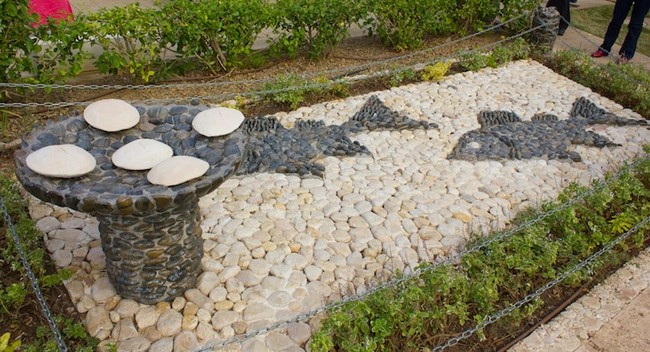This morning’s Gospel reading is John 6:1–15:
Jesus went across the Sea of Galilee. A large crowd followed him, because they saw the signs he was performing on the sick. Jesus went up on the mountain, and there he sat down with his disciples. The Jewish feast of Passover was near. When Jesus raised his eyes and saw that a large crowd was coming to him, he said to Philip, “Where can we buy enough food for them to eat?” He said this to test him, because he himself knew what he was going to do. Philip answered him, “Two hundred days’ wages worth of food would not be enough for each of them to have a little.” One of his disciples, Andrew, the brother of Simon Peter, said to him, “There is a boy here who has five barley loaves and two fish; but what good are these for so many?” Jesus said, “Have the people recline.” Now there was a great deal of grass in that place. So the men reclined, about five thousand in number.
Then Jesus took the loaves, gave thanks, and distributed them to those who were reclining, and also as much of the fish as they wanted. When they had had their fill, he said to his disciples, “Gather the fragments left over, so that nothing will be wasted.” So they collected them, and filled twelve wicker baskets with fragments from the five barley loaves that had been more than they could eat. When the people saw the sign he had done, they said, “This is truly the Prophet, the one who is to come into the world.” Since Jesus knew that they were going to come and carry him off to make him king, he withdrew again to the mountain alone.
They told me there’d be no math!
Back when I was just a young lad, mathematics still consisted of some rote memorization of basic principles, especially multiplication tables. My generation got the leading edge of what was then called New Math, in which Tom Lehrer once acidly observed that it was less important to get the right answer than to understand the process. The multiplication tables provided a good fallback to actually finding the correct solution for those of us not destined to be mathematical geniuses.
And perhaps in some small way, they also brought us closer to the heart of the Lord. Because when we study the scriptures and the long arc of salvation history, we can see a multiplication table of sorts running through all of it.
The Lord wants us to multiply — literally in one sense, as in Genesis 1:28. The Lord commands Adam and Eve to “go forth and multiply” and take stewardship of His creation. God made human flourishing the purpose of His creation, giving us all of the other plants and animals for food (Gen 1:29-30). We were to live on an Earth that would be entirely the Garden of Eden and multiply around it as one communal family with the Lord.
And then … division crept into the equation. And unfortunately, whether it be short division or long division, it’s been with us since. Unlike with multiplication tables, there is no real order to division; from a non-talented math student’s perspective, division is chaos. And that’s even more true in scripture and especially in human relations.
Division first enters in Genesis 3, with the serpent in the Garden of Eden. First the serpent divides Eve from Adam, and then divides both of them from the Lord. That leads to the expulsion from the Garden, the division of Cain and Abel, and from there the divisions of all humanity play out in endless cycles, to this very day. We have divisions between nations and divisions within families, and all points in between.
We also have division within us, the product of Original Sin. We want to love the Lord, but keep falling back into sin. We want to have faith, but we refuse to align our own wills to the Lord. Our fallen natures come from a division of will and soul — part of us clinging to our own desires and ambitions, and yet another part of us yearning to return to the love and care of the Lord.
The Lord wants us to return, too, and keeps offering multiplication as signs as well as parables. Today’s Gospel and the Old Testament reading from 2 Kings 4:42-44 deal with actual events. The latter tells the story of the prophet Elisha feeding a hundred people with twenty barley loaves. Through faith, the loaves multiplied so that all found nourishment and that there was food left over.
We see the same on a much grander scale in the miracle of loaves and fishes in John’s Gospel reading, too. Jesus performs the miracle of multiplication on a vast scale through the faith of those with Him. That multiplication sustains thousands of people, an act of grace in itself, but also allows them to hear the Word of God. The miracle allows them to recognize that Jesus speaks the true Word and to recognize His authority, which in turn allows their faith to increase — to multiply, as it were.
This theme of multiplication in faith appears in other teachings of Jesus, too. For instance, what does Jesus teach us about faith in Matthew 12:31-2? Faith is a seed that multiplies almost infinitely if allowed to grow:
He told them another parable: “The kingdom of heaven is like a mustard seed, which a man took and planted in his field. Though it is the smallest of all seeds, yet when it grows, it is the largest of garden plants and becomes a tree, so that the birds come and perch in its branches.”
In Luke 17:16, Jesus offered another analogy to the mustard seed, in a more pointed manner: “If you had faith like a grain of mustard seed, you could say to this mulberry tree, ‘Be uprooted and planted in the sea,’ and it would obey you.” And in Matthew 21:21, Jesus tells the disciples, “Truly I say to you, if you have faith and do not doubt, you will not only do what was done to the fig tree, but even if you say to this mountain, ‘Be taken up and cast into the sea,’ it will happen.”
For that matter, we also know of the storm on the Sea of Galilee where the disciples fear they will drown. Jesus rebukes them, we read in Matthew 8, calling them “you of little faith,” and proceeds to dispel the storm.
Faith multiplies and strengthens. Division weakens and creates chaos. This theme runs through all of the Scriptures and salvation history; it is very clearly seen in the histories of the Israelites, especially in the Davidic kingdoms of Israel and Judah. The Lord calls us to unity in Him and multiplication through His word, while we continually choose to divide ourselves from Him, from each other, and from our own better natures.
Finally, the greatest call to multiplication — and its greatest miracle — doesn’t come in this passage from Matthew, but instead at the end. When Christ ascends, He gives the Apostles the true mission of the Church: Go forth and make disciples of all nations. How is that accomplished? The apostles set out to found churches around the world by preaching the Gospel and salvation through repentance and unity through Christ.
In practical terms, how does this happen? Apostles go out, usually with one or more of their own students, and preach. The few turn into more disciples, who then organize to keep preaching the Gospel. The more turn into the many, and the many turn into ecclesial communities that help launch other ecclesial communities — all spreading the love and beauty of the Word of God.
That’s not just multiplication — it’s exponential multiplication. That is the power of faith, and the way in which the mustard seed of Jesus’ teaching exploded into a worldwide church that offers all the invitation to salvation through God’s word. It takes the seemingly meager fare from a forgotten corner of the world and turns it into a perpetual banquet at which all of God’s children can feed, literally so in the Eucharist and figuratively in how the Gospel feeds and sustains us to this day, two thousand years after the events they relate took place.
When we have faith and God’s grace, we can move mountains, and we can feed the multitudes with the simple Gospel of God’s love through Jesus Christ. Faith multiplies, and with it our own ability to grasp the beauty and truth of His love.
PS. Don’t get me started on the quadratic formula.
Previous reflections on these readings:
The front page image is a garden at the Church of the Multiplication of the Loaves and Fish in Tabgha, Sea of Galilee, Israel. Taken by Ed Morrissey in 2013.
“Sunday Reflection” is a regular feature, looking at the specific readings used in today’s Mass in Catholic parishes around the world. The reflection represents only my own point of view, intended to help prepare myself for the Lord’s day and perhaps spark a meaningful discussion. Previous Sunday Reflections from the main page can be found here.
Read the full article here






![Mel Gibson Has A Lot of Questions About the CA Fires, Mocks Newsom with an Epic One-Liner [WATCH] Mel Gibson Has A Lot of Questions About the CA Fires, Mocks Newsom with an Epic One-Liner [WATCH]](https://www.rvmnews.com/wp-content/uploads/2024/10/2024.10.25-12.45-rvmnews-671b92d6c7835.jpg)



![Gavin Newsom Begs Biden to ‘Deal With’ People Spreading ‘Misinformation’ On His Wildfire Response [WATCH] Gavin Newsom Begs Biden to ‘Deal With’ People Spreading ‘Misinformation’ On His Wildfire Response [WATCH]](https://www.rvmnews.com/wp-content/uploads/2024/06/2024.06.24-03.14-rvmnews-66798d3c0b271.jpg)